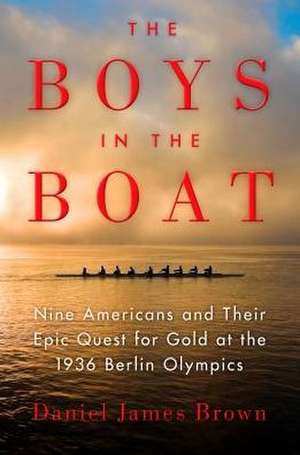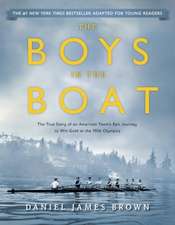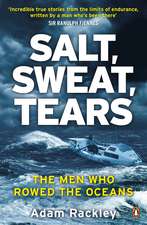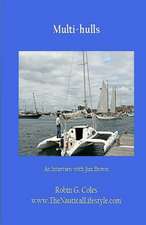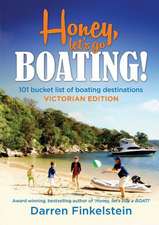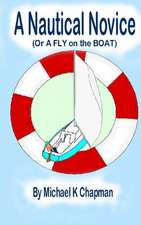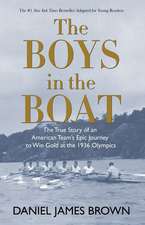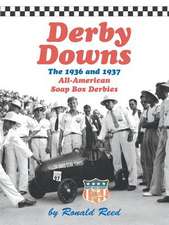The Boys in the Boat: Nine Americans and Their Epic Quest for Gold at the 1936 Berlin Olympics
Autor Daniel James Brownen Limba Engleză Paperback – 2 iun 2014 – vârsta de la 18 ani
Vezi toate premiile Carte premiată
Daniel James Brown's robust book tells the story of the University of Washington's 1936 eight-oar crew and their epic quest for an Olympic gold medal, a team that transformed the sport and grabbed the attention of millions of Americans. The sons of loggers, shipyard workers, and farmers, the boys defeated elite rivals first from eastern and British universities and finally the German crew rowing for Adolf Hitler in the Olympic games in Berlin, 1936.
The emotional heart of the story lies with one rower, Joe Rantz, a teenager without family or prospects, who rows not for glory, but to regain his shattered self-regard and to find a place he can call home. The crew is assembled by an enigmatic coach and mentored by a visionary, eccentric British boat builder, but it is their trust in each other that makes them a victorious
| Toate formatele și edițiile | Preț | Express |
|---|---|---|
| Paperback (2) | 48.92 lei 3-5 săpt. | +33.79 lei 7-11 zile |
| Pan Macmillan – 2 ian 2014 | 48.92 lei 3-5 săpt. | +33.79 lei 7-11 zile |
| Large Print Press – 2 iun 2014 | 125.56 lei 3-5 săpt. | |
| Hardback (2) | 202.83 lei 3-5 săpt. | |
| Viking Books – 3 iun 2013 | 202.83 lei 3-5 săpt. | |
| Thorndike Press – 16 iul 2013 | 270.97 lei 3-5 săpt. |
Preț: 125.56 lei
Nou
24.03€ • 26.09$ • 20.18£
Carte disponibilă
Livrare economică 01-15 aprilie
Specificații
ISBN-10: 159413779X
Pagini: 741
Dimensiuni: 140 x 216 x 38 mm
Greutate: 0.89 kg
Ediția:Text mare
Editura: Large Print Press
Notă biografică
Descriere
For readers of Laura Hillenbrand's "Seabiscuit" and "Unbroken" comes the dramatic story of the American rowing team that stunned the world at Hitler's 1936 Berlin Olympics. Brown draws on the team's own journals, photos, and memories of a once-in-a-lifetime shared dream.
Recenzii
- Mitchell Zuckoff, author of Lost in Shangri-La and Frozen in Time
“In 1936 nine working-class American boys burst from their small towns into the international limelight, unexpectedly wiping the smile off Adolph Hitler’s face by beating his vaunted German team to capture the Olympic gold medal. Daniel James Brown has written a robust, emotional snapshot of an era, a book you will recommend to your best friends.
--James Bradley, author of Flags of our Fathers and Flyboys
“I really can't rave enough about this book. Daniel James Brown has not only captured the hearts and souls of the University of Washington rowers who raced in the 1936 Olympics, he has conjured up an era of history. Brown's evocation of Seattle in the Depression years is dazzling, his limning of character, especially the hardscrabble hero Joe Rantz, is novelistic, his narration of the boat races and the sinister-exalted atmosphere of Berlin in 1936 is cinematic. I read the last fifty pages with white knuckles, and the last twenty-five with tears in my eyes. History, sports, human interest, weather, suspense, design, physics, oppression and inspiration -- The Boats in the Boat has it all and Brown does full justice to his terrific material. This is Chariots of Fire with oars.”
--David Laskin, author of The Children's Blizzard and The Long Way Home
“A lovingly crafted saga of sweat and idealism that raised goosebumps from the first page. I was enthralled by the story's play of light and shadow, of mortality and immortality, and its multidimensional recreation of the pursuit of excellence. This meditation on human frailty and possibility sneaks up on you until it rushes past with the speed of an eight-oared boat."
--Laurence Bergreen, author of Columbus and Over the Edge of the World
“The Boys in the Boat is an exciting blend of history and Olympic sport. I was drawn in as much by the personal stories as I was by the Olympic glory. A must read for anyone looking to be inspired!"
--Luke McGee, USA Rowing Men’s National Team Coach
“The Boys in the Boat is not only a great and inspiring true story; it is a fascinating work of history."
--Nathaniel Philbrick, author of Mayflower and In the Heart of the Sea
“A lovingly crafted saga of sweat and idealism that raised goosebumps from the first page. I was enthralled by the story's play of light and shadow, of mortality and immortality, and its multidimensional recreation of the pursuit of excellence. This meditation on human frailty and possibility sneaks up on you until it rushes past with the speed of an eight-oared boat."
- Laurence Bergreen, author of Columbus and Over the Edge of the World
“For years I’ve stared and wondered about the old wooden boat resting on the top rack of the UW boathouse. I knew the names of the men that rowed it but never really knew who they were. After reading this book, I feel like I got to relive their journey and witness what it was truly like earning a seat in that Pocock shell. The passion and determination showed by Joe and the rest of the boys in the boat are what every rower aspires to. I will never look at that wooden boat the same again.”
- Mary Whipple, Olympic gold medal–winning coxswain, women’s eight-oared crew, 2008 and 2012
“Daniel Brown’s book tells the dramatic story of the crew that set the stage for Seattle emerging as a world-class city. Their lives define the tradition that is still University of Washington rowing today.”
- Bob Ernst, director of rowing, University of Washington
Extras
In a sport like this—hard work, not much glory, but still popular in every century—well, there must be some beauty which ordinary men can’t see, but extraordinary men do. —George Yeoman Pocock
This book was born on a cold, drizzly, late spring day when I clambered over the split-rail cedar fence that surrounds my pasture and made my way through wet woods to the modest frame house where Joe Rantz lay dying.
I knew only two things about Joe when I knocked on his daughter Judy’s door that day. I knew that in his midseventies he had single-handedly hauled a number of cedar logs down a mountain, then hand-split the rails and cut the posts and installed all 2,224 linear feet of the pasture fence I had just climbed over—a task so herculean I shake my head in wonderment whenever I think about it. And I knew that he had been one of nine young men from the state of Washington—farm boys, fishermen, and loggers—who shocked both the rowing world and Adolf Hitler by winning the gold medal in eight-oared rowing at the 1936 Olympics.
When Judy opened the door and ushered me into her cozy living room, Joe was stretched out in a recliner with his feet up, all six foot three of him. He was wearing a gray sweat suit and bright red, down-filled booties. He had a thin white beard. His skin was sallow, his eyes puffy—results of the congestive heart failure from which he was dying. An oxygen tank stood nearby. A fire was popping and hissing in the woodstove. The walls were covered with old family photos. A glass display case crammed with dolls and porcelain horses and rose-patterned china stood against the far wall. Rain flecked a window that looked out into the woods. Jazz tunes from the thirties and forties were playing quietly on the stereo.
Judy introduced me, and Joe offered me an extraordinarily long, thin hand. Judy had been reading one of my books aloud to Joe, and he wanted to meet me and talk about it. As a young man, he had, by extraordinary coincidence, been a friend of Angus Hay Jr.—the son of a person central to the story of that book. So we talked about that for a while. Then the conversation began to turn to his own life.
His voice was reedy, fragile, and attenuated almost to the breaking point. From time to time he faded into silence. Slowly, though, with cautious prompting from his daughter, he began to spin out some of the threads of his life story. Recalling his childhood and his young adulthood during the Great Depression, he spoke haltingly but resolutely about a series of hardships he had endured and obstacles he had overcome, a tale that, as I sat taking notes, at first surprised and then astonished me.
But it wasn’t until he began to talk about his rowing career at the University of Washington that he started, from time to time, to cry. He talked about learning the art of rowing, about shells and oars, about tactics and technique. He reminisced about long, cold hours on the water under steel-gray skies, about smashing victories and defeats narrowly averted, about traveling to Germany and marching under Hitler’s eyes into the Olympic Stadium in Berlin, and about his crewmates. None of these recollections brought him to tears, though. It was when he tried to talk about “the boat” that his words began to falter and tears welled up in his bright eyes.
At first I thought he meant the Husky Clipper, the racing shell in which he had rowed his way to glory. Or did he mean his teammates, the improbable assemblage of young men who had pulled off one of rowing’s greatest achievements? Finally, watching Joe struggle for composure over and over, I realized that “the boat” was something more than just the shell or its crew. To Joe, it encompassed but transcended both—it was something mysterious and almost beyond definition. It was a shared experience—a singular thing that had unfolded in a golden sliver of time long gone, when nine good-hearted young men strove together, pulled together as one, gave everything they had for one another, bound together forever by pride and respect and love. Joe was crying, at least in part, for the loss of that vanished moment but much more, I think, for the sheer beauty of it.
As I was preparing to leave that afternoon, Judy removed Joe’s gold medal from the glass case against the wall and handed it to me. While I was admiring it, she told me that it had vanished years before. The family had searched Joe’s house high and low but had finally given it up as lost. Only many years later, when they were remodeling the house, had they finally found it concealed in some insulating material in the attic. A squirrel had apparently taken a liking to the glimmer of the gold and hidden the medal away in its nest as a personal treasure. As Judy was telling me this, it occurred to me that Joe’s story, like the medal, had been squirreled away out of sight for too long.
I shook Joe’s hand again and told him I would like to come back and talk to him some more, and that I’d like to write a book about his rowing days. Joe grasped my hand again and said he’d like that, but then his voice broke once more and he admonished me gently, “But not just about me. It has to be about the boat.”
Premii
- ALA Notable Books Winner, 2014
- Indies Choice Book Awards Winner, 2014
- Nautilus Award Winner, 2014
- Saroyan Writing Prize Finalist, 2014
- Washington State Book Award Winner, 2014
